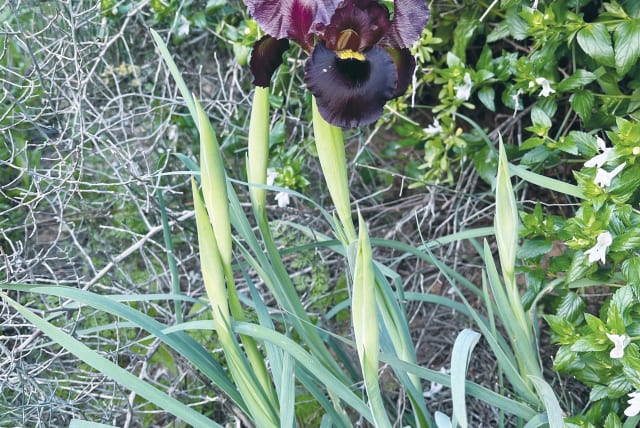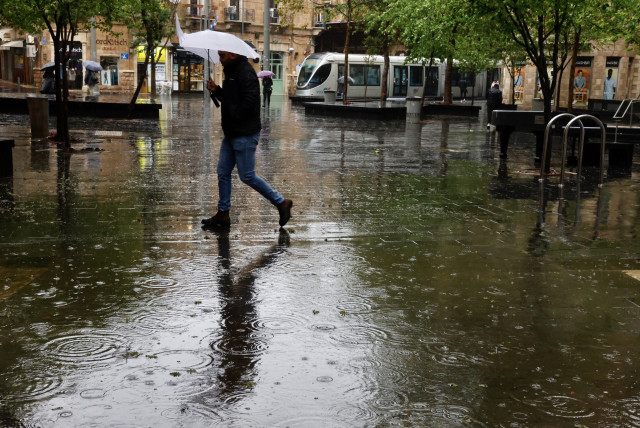Kalaniyot flowers giving us hope - comment

Surrounded by such natural beauty, it’s hard to believe that just over 100 kilometers away in both directions, war is raging.
Israelis have been subjected to a harsh winter on all fronts, culminating in 14 straight days of rain for the first time in over 30 years, bringing with it flooding in much of the country.
The last few months have taken their toll on everyone here. Living in the shadow of war is stressful, not just for those directly affected by it, but for society as a whole. The daily diet of news coming from the frontlines, including fallen and wounded soldiers, as well as heartbreaking stories about the hostages and their families who are facing unimaginable pain and suffering, is almost too much to bear at times.
Nevertheless, the world keeps on turning and we must continue with our lives, however difficult that may be.
On a positive note, for those living in Israel, there are some small signs of hope all around, if you look for them.
Mother Nature has been hard at work, spoiling us with her creations. Rare flowers, such as black irises and red kalaniyot (anemones) that bloom for a only short while are now out in force and they’re a sight to behold.

One of the joys of living here at this time of year is visiting the countryside and nature reserves where all types of wildflowers can be found. Israelis traditionally flocked from all over the country to witness their unique beauty.
With these gems on our doorstep, I have taken to walking the dogs along the cliff-tops where these flowers grow in abundance.
This stunning tall black iris, with its blackish-purple leaves, while much loved by Israelis, is the national flower of Jordan. I was first alerted to its presence this year by the sight of a man on all fours in the middle of a field. As I approached, it became apparent that he was photographing a single bloom – one of the first to grace the land of milk and honey this season.
Not wanting to intrude on what was clearly an important moment for him, I hung back until he’d finished photographing the flower from every angle. Then I adopted the same ungainly position and took dozens of photographs myself.
Hidden clusters of flowers
THAT SINGLE bloom has now flourished exponentially. Hidden clusters of these rare gems can be found all over the lush green cliff-tops, interspersed with specs of red where the smaller red flowers, equally stunning, are also out in full force.
The anemone earned its Hebrew name, kalanit (pl. kalaniyot) from the Hebrew word kala which means “bride,” due to its beauty and majesty, thus evoking a bride on her wedding day.
These delicate red blooms have held a significant place in the hearts of Israelis since the creation of the state. There is even a song named after them, “kalaniyot,” by Israeli composer Moshe Vilensky that became popular in the days leading up to the establishment of the State of Israel. It describes a little girl who dreams she is gathering these tiny red flowers in a basket to bring to her mother. The song was used as a code during the British Mandate to alert Jewish fighters to the presence of British soldiers, alluding to their red berets.
The annual appearance of these flowers always creates excitement among Israelis, however, this year, it takes on new meaning.
As the seasons change and spring approaches, they serve as tiny signs of renewal – reminders that there is goodness and beauty in the world.
Although I’m fortunate to have a smattering of these delights so close to home, they grow in wild abundance in other parts of the country, including the Negev, where blankets of red stretching for miles are not an uncommon sight, drawing visitors from far and wide. There is even a festival called Adom Darom (“Red South”) that celebrates the spectacle.
Surrounded by such natural beauty, it’s hard to believe that just over 100 kilometers away in both directions, war is raging. With that in mind, this year it’s even more important to harness the positivity of nature by witnessing its beauty and reminding ourselves that goodness still exists.
With the blossoming of the kalaniyot comes renewed hope:
Sunset on the hill will blaze and go out
but the kalaniyot will always bloom.
Storms will thunder and roar greatly
but the kalaniyot will always bloom.
(From “kalaniyot,” lyrics by Nathan Alterman)
The writer is a former lawyer from Manchester, England. She now lives in Israel and works at The Jerusalem Post.
